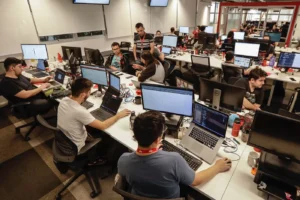Innovation director Marcos Gurgel explains how data analysis guides the company's disruptive projects
The data driven culture, in which decisions are always made based on data, is at the center of all iFood innovation projects. To share with the public how this happens, Marcos Gurgel, director of innovation at iFood, participated in a live with Leandro Jardim, marketing director at digital marketing agency Cortex, and gave more details about this process.
To begin with, he gave the example of the idea of using drones to make deliveries. “This was a project that was born from data. First we asked ourselves things like which distances we could shorten with the use of drones or which routes took the longest, despite being short”, explains Marcos. “With analysis of operation data, we saw that there was an opportunity to optimize logistics and expand the coverage area and that Aracaju was the best region to start.”
At iFood, the team specializing in data science does not work behind closed doors, in a department separate from the others. On the contrary: business and data teams play together, often with data professionals dedicating 100% of their time to an innovation squad. “We don’t look at the data area simply as a provider of information. We bring the problems and they ask the questions. We don't ask for data, we take the pain. This changed our innovation process from water to wine.”
Another important step, according to the director, was to disseminate, from the data science area, the data driven culture and this knowledge to the other teams. “Today we have qualified people to do data analysis in the business team”, says Marcos. “This way, the data area does not become a bottleneck for the rest of the company, which absurdly reduces project time.”
In the conversation, Marcos also explained when data analysis is used in the company's innovation journey:
Proof of ideas
Without discarding creativity and intuition, teams involved in innovation projects at iFood use data at this stage to reduce the risk of the endeavor. “Here, the continuity of this type of project depends more on supporting and proving the potential of the idea than if it is someone’s request”, says Marcos.
“I also have a bad idea. What makes me happy is when someone analyzes the data and says that, despite looking good, this idea won't work in the future, that it won't stand still, even if it's something the market is already doing.”
Project evolution
iFood's innovation projects are developed by multidisciplinary teams in so-called Jet Skis, where teams learn by testing, getting things right, making mistakes and changing directions quickly. To achieve this, the teams are supported with weekly data analysis. “The essence of Jet Ski is to fly based on data, not on intuition, on intuition, on the desire to do it. It is the data that gives the direction of where the Jet Ski pilot should go.”
For him, the data driven team's perspective is what makes iFood stand out from the crowd. He gives an example: when foodtech started working with live commerce, performance questions focused on what the conversion numbers were.
“When the data team entered the process, they began to question the creation of awareness, how many people entered and interacted on the live”, says Marcos. “Based on this provocation, we changed the rules and, in the end, we had an increase in the number of orders. This only happened because they fine-tuned where the business team wasn’t looking.”
Investment decision
Data analysis is also used to define investment decisions in startups or in other companies involved in open innovation. “Before closing a deal, we evaluate how much benefit this company will generate, how much it will make the iFood ecosystem grow”, points out Marcos.
If you liked the topic and want to know more about data driven culture, download here, free of charge, the e-book “Data analysis in business: a step-by-step guide to a data-driven culture in 2022”.
Read more:
New Economy: how the data driven model is applied in companies
5 data-driven Sales and Marketing trends
Artificial Intelligence: what it is and how important it is for business
PR in the New Economy: how data-based communication is carried out


